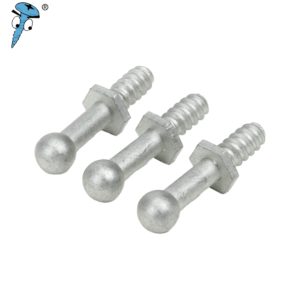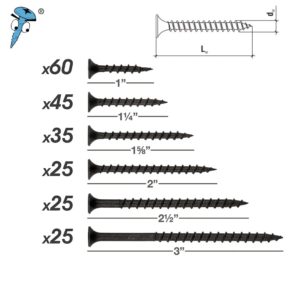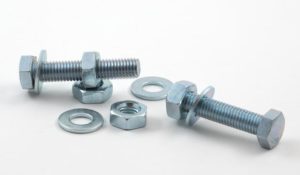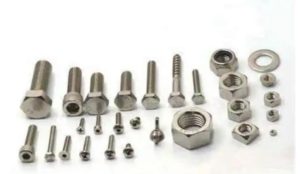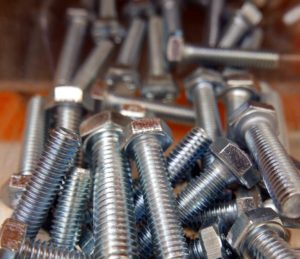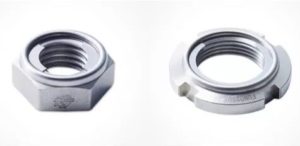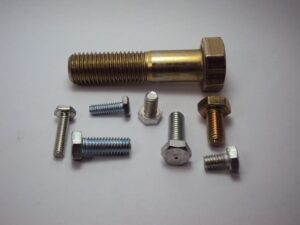What are the types of bolt fasteners?
Bolts are considered a common type of fastener and are closely related to screws. They are a type of mechanical fastener that is used to join materials together with the help of a matching nut or a washer to secure its application. Many types of bolts are manufactured every day by numerous fastener suppliers in the worldwide market.
The various kinds of bolt fasteners may also characterize the difference in their features but in this article, the types of bolts are first to be discussed as follows.
Types of bolt fasteners:
Anchor Bolts
Arbor Bolts
Blind Bolts
Carriage Bolts
Elevator Bolts
Eye Bolts
Flange Bolts
Hex Bolts
Hull Bolts
J-Bolts
Lag Bolts
Machine Bolts
Hanger Bolts
Penta-Head Bolts
Plow Bolts
Rock Bolts
Round Head Bolts
Serrated Flange Bolts
Sex Bolts or Chicago Bolts
Shoulder Bolts
Socket Head Bolts
Square Bolts
Stud Bolts
T-Head Bolts
Tap Bolts
Toggle Bolts
Track Bolts
U-Bolts
- Anchor Bolts – are usually used in the construction industry for joining components into concrete surfaces or bases of steel poles. Two classifications of anchor bolt fasteners are cast-in-place anchor bolts and drilled-in-place anchor bolts. While the common types of anchor bolts are headed anchor bolts and bent anchor bolts.
- Arbor Bolts – they have reversed threads that are specifically made with the use of power tools such as a miter saw. The characteristic of Arbor bolt fasteners is that they usually have black finishing and a washer permanently attached to their head.
- Blind Bolts – generally involve three parts, a steel pin, a collar, and a sleeve. It allows the fastening of materials from one side of the pre-drilled hole to the restricted area, locking them completely.
- Carriage Bolts – the name was invented for its original purpose of constructing carriages in the early years. They are mainly used in wood base materials and wood-to-metal applications.
- Elevator Bolts – as the name implies were originally used in elevator systems because it doesn’t interfere with their operations. Elevator bolt fasteners are partially threaded with a flat round head.
- Eye Bolts – are used to lodge forces from above or below with is loop ring on the end for the connection point of rigging, hoisting, lifting, anchoring, and pulling applications.
- Flange Bolts – consists of a flange head that acts like a washer distributing the load in the wider area. They are useful in areas of automotive, piping systems, plumbing, and more.
- Hex Bolts – also known as machine screws, Hex bolts, or Hexagonal Head bolt fasteners are used in tight spaces like buildings, bridges, highway structures, and more.
- J-Bolts – are bolts with a bent part or J-shaped bolt fasteners often to secure walls to concrete foundations.
- Lag Bolts – is one of the toughest fasteners also technically considered a screw because of the lack of need for nuts. They are usually used in areas that give heavy loads like lumber or wooden materials.
- Machine Bolts – generally have hex or square heads for easy wrench use. Machine bolt fasteners can come in different sizes for higher effectiveness of fastening materials together.
- Hanger Bolts – are made of half lag-screw and machine-bolt thread with an end user to tap into surfaces of timber construction.
- Penta-Head Bolts – are five-headed bolts (pentagon-shaped) that require a special socket tool for installing and loosening. They are used in securing polymer concrete vaults, meter boxes, pole top transformers, and others.
- Plow Bolts – are usually used in heavy equipment because of their characteristics to tighten and sit flush within their countersunk heads. Plow bolt fasteners are similar to carriage bolts that are commonly used in wood applications.
- Rock Bolts – is a type of anchor bolt that supports a framework for stabilizing slopes. They are used in underground mining, tunneling, or any rock structures.
- Round Head Bolts – button heads or round head bolts are used in wood materials and are similar to carriage bolts.
- Serrated Flange Bolts – this type of bolt has a circular flange under the head with a teeth grip that holds into surfaces tightly to resist vibrations and loosening. They are common use in plumbing and electronic product casings.
- Sex Bolts or Chicago Bolts – are mating bolt fasteners known by many names and have a variety of use. The Sex Bolt consists of a female barrel component and a male threaded screw combining a nut and a screw with components that serves as a binding material on gaps of two parts.
- Shoulder Bolts – features a large unthreaded part under its heads which extends into the embedded surface for the ability to move around. It is usually applied in mechanical situations such as engines, linkages, pulleys, and vacuum systems.
- Socket Head Bolts – also known as socket head cap screws and are machine screw that requires wrench tools for turning. These bolts are internally threaded and are suited for applications in confined spaces like machine assembly.
- Square Bolts – lag bolts or lag screws provide a rustic look to match old structures because of their large head feature that allows an easy tooling situation with the use of a wrench.
- Stud Bolts – are essentially a substitute for bolt and nut assembly with external threads on both ends of the shaft which is then installed with the use of a hexagon nut. This bolt fastener is also known as a double-headed screw used in high-pressure boltings in the petrochemical and pipeline industries.
- T-Head Bolts – otherwise known as Hammer-head bolts, tank-strap bolts, and T-bolts showing large T-shaped features are used in band clamp and fastening lift guide rails that sit flush on surrounding material.
- Tap Bolts – are fully threaded hex bolts with similar tolerance to cap screws and are used to attach motors to machines or in automotive and industrial applications.
- Toggle Bolts – has an increased loading capacity compared to a regular bolt fastener. They contain spring-loaded wings which expand in the hollow wall once installed. Generally used in hanging items inside the household like plants, bookshelves, and ceiling fans.
- Track Bolts – are used on railway tracks and are commonly made with high-strength steel treated with a finishing of corrosion resistance and are added with vibration material such as a washer.
- U-Bolts – is a curved metal rod in U-shaped with threaded ends on both sides. Used in hanging and securing pipes, tubes, and other structures in need of restraint.
How are bolts manufactured?
Bolts can come in different various types and classifications (shapes, sizes, and features) but the production process remains the same for most fabrication from fastener suppliers. The material commonly used in manufacturing bolts are standard grades of carbon steel that come with surface treatments for higher efficiency and strength of use. While the common method of producing bolts or fasteners is hot-forging bar stock to a high temperature to make the material pliable and then drawn into a forging press. Some methods are also performed by fastener manufacturers such as cold-forming and machining, the preferable way will be implemented depending on the material and the requirement of the effectiveness of a bolt.
Cold-forging
Cold-forging or cold-forming is a method of processing metal materials at near room temperature squeezing the dies until the components assume their shape. The deforming of the workpiece below its recrystallization point allows the material to be ductile and stronger in resistance. Cold-forming is an advantageous method for fastener suppliers because of the high-speed manufacturing and less finishing requirement of the product, however, it can only produce certain types and shapes because some materials are limited to the method.
Hot-forging
Hot-forging is the common method of producing fasteners in high temperatures to achieve a malleable state of materials. The process of hot-forging is done by fastener suppliers to stamp heated metal before undergoing in the press to be squeezed in between dies and tool.
Modifications of sizes, shapes, and thread forms are easily molded in hot-forging but when compared to cold-forming it is more intricate way and cost expensive.
Machining
Machining is another method of processing fasteners that includes turning, milling, and drilling a material using a machine tool to achieve precise shapes or non-standard fasteners in small quantities. It is the ideal way for fastener suppliers on creating custom-designed fasteners for efficiency under miscellaneous categories including shaping, planning, boring, broaching, and sawing.
Thread forming
Thread forming is distinguished from thread rolling because of the difference in the manufacturing process, thread rolling is the forming of external threads in fasteners while Thread forming is a process of installing internal threads on screws and bolts for the products to ease the difficulty in application. Generally, the cylindrical or spiral form in the surface of fasteners is defined in its ability to tap and performance in application. Internal threads are common on nuts and tapped holes, while external threads are those in bolts, studs, or screws. Most fastener suppliers never miss this process for the production of nuts and bolts.
Surface treatment
In metallurgy, surface treatments or heat treatments are essential for increasing physical properties such as the strength and ductility of fasteners. It’s usually referred to as coatings or finishings by fastener suppliers due to its broad techniques in the quality desired for the product. Some benefits of surface treatments are; corrosion resistance, less friction, wear and tear prevention, durability, lowered cost in maintenance, and more. Coatings vary in three categories of architectural, industrial, and special purpose for the primary function to protect the surface of the product from the environment. While types of surface treatments according to most fastener suppliers include Electroplating, Electroless Plating, Anodic Oxidation, Hot Dipping, Vacuum Plating, Painting, and Thermal Spraying.
The process work of manufacturing nuts and bolts can be defined in more complex methods but the basic way of creating fasteners is just as listed methods above. Hence, variations and differences in production are performed by fastener suppliers in cases of customization and special requirements of essential characters in fastening applications.
Are bolts stronger than screws?
Bolts and screws are a type of fastener that holds and secures materials in place. Generally, screws possess the same function that bolts provide, however, bolts are the preferred choice over screws because of their tremendous amount of strength and power. Unlike screws, bolts require a nut or washer in installation allowing them to provide a greater holding grip on surface area and reducing the loosening of installation. How are screws made?
The obvious factor that bolts and screws have in common are the various types sizes, shapes, functions, and qualities in an application. Bolts offer a secure hold in applications to surfaces and have an easier way of removal from the use of available tooling materials, making its workload easier. Bolts and screws are also applied in almost the same fields of industry and projects, they can be tapped and inserted in concrete, wood, metal, lumber, sheet metals, and more. Another factor that is always viewed in many cases is the cost of the fastener bolts and screws, screws are an advantage cheaper than bolts. Bolts and nuts are more costly in the manner of materials used and processes conducted to provide efficiency and quality. In terms of maintenance and longevity, bolts and nuts are the perfect fastener material for certain projects that don’t require most repairs and are always in stock from fastener suppliers.
Bolts and nuts have higher advantages than screws and are normally stronger in hold with the presence of a nut and washer in the installation it spreads out the load on a larger surface making it greater merit for heavy-duty applications. Knowing what fastener to use in projects is a definite role to imply because the variability of bolts and nuts from screws can exert a contrast in the successful operation of fastening materials. The decision to choose the right bolts and nuts from a reliable fastener supplier can be arranged in consideration of the factors which are also mentioned below in the article.
What are the clamping force fasteners in bolts?
Bolts and nuts are produced in different configurations by fastener suppliers which influences the overall mechanical strength is provides. Clamping force is the force exerted as a result of tightening joints or clamping units together, or simply a compression force from the application of bolts. Clamping force is produced in engaging components with the use of fasteners or bolts to be exact for keeping the thread in place.
There are four (4) main forces generated in the installation of bolts; clamping force, preloading force, shear force, and tension force. The clamping force is the main mechanical force that secures the holding together, it is determined by the factors resulting from the other forces. A higher preload force configures better chances of successful clamping force and a precise tightening installation creates a little pressure to no direct shear force.
The measurement of clamping force of bolts and nuts is calculated by factors impacting the bolts and specifications including dimensions, forming materials, and post-fabrication finishing. These attributes are discussed widely in technicality from an outstanding service of good fastener suppliers.
What are the applications of bolts?
The vast applications of bolts in many industries consist of a good deal of differences. With the different types of bolts and nuts also comes the different applications of usage. Generally, bolt fasteners are applied to wood or metal components that are used in construction, building machines & materials, repair of bridges, railways, highways, docks, and other elements, to structural and concrete applications. Many other applications in industries are known to exist from the masses of fastener suppliers that have served the various types of bolts and nuts to the niche markets.
Advantages of Bolts and nuts:
- Bolts have excellent life-cycle and durability, they can come in handy preference of longevity because of the advantage of less maintenance resulting in a budget cost of materials in the long run compared to other fasteners.
- The uncomplicated installation and removal of bolts with the use convenient of fastening tools provide the applications of bolts with ease for projects.
- Most bolts have the feature of corrosion resistance that is essentially needed in many applications.
- The wide stock production and availability of fasteners. Bolts are a common type of fastener that’s why they can be manufactured in quantity by fastener suppliers for meeting the demand in the market.
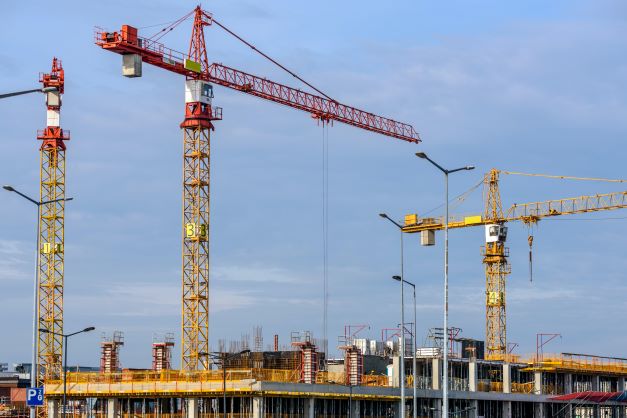


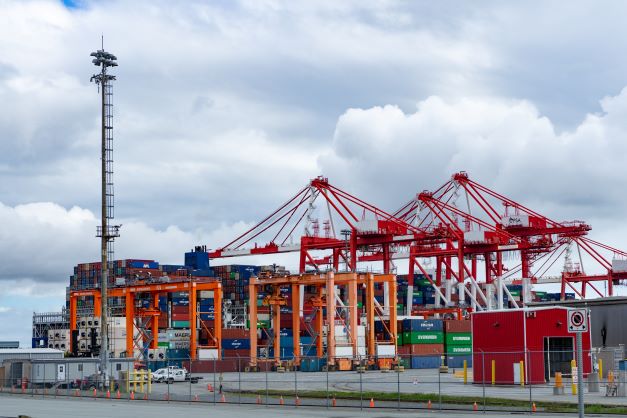
Factors that Determine the Applications of Bolts
Bolt material
Selecting the accurate material for the production of bolts and nuts is vital because it affects the performance in the application of the fasteners. Bolt fasteners are used in heavy-duty applications due to their high strength function in holding materials, but to achieve this efficacy the selection of suitable material for every application should be precise for its qualities. Some commonly used materials in bolt manufacturing by fastener suppliers are;
Steel
Steel is a variant of metal, although it is not purely composed of metal components and can’t be called a metal because it is considered an alloy of iron and carbon. Steel is the most important material used by fastener suppliers in worldwide engineering and construction. It provides improved strength and resistance to fracture or breakage due to its elements. The composition of its high-tensile strength and cheap cost makes it variable in many applications to buildings, infrastructure, tools, ships, machines, electrical appliances, automobiles, and cars.
Stainless Steel
Stainless steel is a form of alloy that has a mix of amounts of carbon, chromium, iron, and non-metal elements making it resistant to corrosion and self-heal in the presence of oxygen. Stainless steel has two types, Martensitic and Austenitic.
Martensitic stainless steel has elements that can be treated in the heat for increasing its quality in strength and durability making it acquire a low corrosion resistance.
Austenitic stainless steel is the common kind used in bolts and other fastener products because of its feature to take in loads of pressure without breakage, and its superiority corrosion resistance due to the high levels of nickel and chromium it possesses.
Some fastener types made of stainless steel material are self-drilling screws, self-tapping screws, chipboard screws, wood screws, and concrete screws.
Bronze and Brass
Bronze and brass are ideally metal alloys that have a composition of two or more different metals. Bronze is made up of copper and tin, while brass is composed of copper and zinc which can be combined with other elements such as phosphorus or aluminum. They belong to the category of red metals because of their distinctive color and unique properties that make them a favorable use in the production of bolts. Both materials give a feature of high resistance to corrosion and are ideal for use in extensive everyday objects or bigger applications in industries.
Nylon
Nylon is a synthetic material made of polymers or polyamides which is derived from crude oil that has undergone an intensive chemical process to melt into fibers, films, and shapes. Nylon has the characteristic of corrosion resistance making it an ideal material in applications to superior thermal and electrical insulating surfaces.
Bolt Finishing
Bolts are fasteners that require finishings and coatings to improve their overall performance in applications. Just like the variations of the types of bolts, this process also takes a different approach in kind and manufacturing. High-quality finishing is considered a requirement in most bolts and nuts while low-quality finishes are sometimes unnecessary for the products made by fastener suppliers.
Here are some of the various types of finishing and coatings for bolts and nuts.
- Plain finish – automatically refers to a plain or no coating, natural and self-color of the bolt. When a product is considered to have plain finishing it is not immune to corrosion and provides no resistance to it.
- Zinc plated – zinc coating on bolts gives it a smooth, good look, and clean finish enabling the surface for painting when required. Zinc coating is cheap and can provide high resistance when applied in thickness.
- Zinc and clear chromate – bright zinc, clear zinc chromate, or dichromate is a colorless chromate conversion coating in after plating process which offers additional resistance and protection from corrosion.
- Zinc and yellow chromate – Yellow zinc plating provides a dominant yellow tone appearance with a heavier mixture from clear chromate making it more resistant to corrosion.
- Hot dipped galvanized (HDG) – is a standard and popular finish for bolts especially for the types used in coastal areas and industries because of its high resistance to salt properties from the thick layer of zinc coating in hot dip galvanizing.
- Class 3 – this coating is similar to HDG and is better in providing a socket fit with the properties of corrosion resistance and zinc or tin coating.
- Cadmium plated – this finishing has been replaced with zinc plating due to its environmental issues from cadmium poisoning.
- Decorative finish – as the name implies it does a decorative appearance on bolts and some examples are bronze metal antique (BMA), florentine bronze, brassed and nickel plated. It however does not add resistance to corrosion as it is only ideal for indoor applications.
Brass, Bronze, Chrome, or Nickel-Plated – are visually appealing finishes on fasteners. Brass and bronze have a very high resistance to corrosion while chrome and nickel plating conducts minimal corrosion resistance and are only usually chosen for their decorative finish.
Electro Galvanized – are only used in areas requiring less corrosion protection because of the thin layer of zinc provided in the process.
Grey Phosphate – grey phosphate coating is a popular finishing for fasteners that lengthens their lifespan and resistance to corrosion but is only good in indoor applications.
Ceramic Coated – ceramic coating on fasteners acts as a building block to corrosion and a great lubrication feature in tightening of installation therefore is mostly used in marine and other corrosion-prone areas because the coating is designed to surpass the salt water spray tests.
Enough of the factors that contribute to the applications of bolts and fasteners are selected through their capabilities in resistance to corrosion and high-strength performance. Many elements take part in the decision to choose the right type of bolts and nuts for overall functionality. And good technical support from an exceptional fastener supplier or company will help you to choose accurate and precise solutions for the needs of your project. The purpose of manufacturing a good kind of bolts and nuts is for effectiveness and safety in applications, for this reason, quality in service and quality in products are equally sustainable to find the right fastening solutions.




